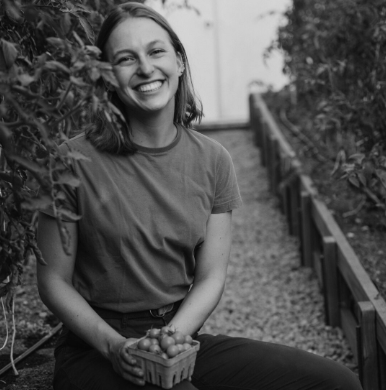During the several months of interviews I conducted, I met with ranchers in work trucks, in hay barns, and in farm shops. I accompanied ranchers setting up fence, moving cattle, hauling round bales, checking sprinklers, and packing plant samples. We chatted over kitchen tables and on back porches, sharing meals and sharing stories. In addition to ranchers, farmers, elected officials, and government agency representatives, I met their spouses, children, in-laws, cattle dogs, and house cats. The great joy of my research has been in connecting with people, face-to-face, and talking about some of the things that matter most: land, community, connection, and ways of life. During my last few days in the San Luis Valley, I visited several of the women I first spoke with early on in my research. I drank sweet pea tea in the kitchen of a cattle rancher, drove through recently-cut hay fields with a sheep herder, and ate brunch under an apple tree with a life-long conservationist. Each woman spent a career devoted to stewarding land, be it with sheep, cattle, or conservation easements.
Driving out of the San Luis Valley and heading toward New Haven at the end of my research season, I drove across the Eastern Plains of Colorado and into western Nebraska. As far as I could see from I-80, stretched cattle pastures, hay fields cut and baled, and center pivot irrigation systems. As in the San Luis Valley, center pivots mine the aquifer in western Nebraska, here pulling from the Ogallala. Similar to the San Luis Valley, fields of monoculture commodity crops stretch away from the highway. On this crosscountry drive, unlike that at the start of my research, looking out at the landscape, I thought of the roads, school systems, county services, and families sustained by these fields. As in the San Luis Valley, beyond the acres of crops and pasture, are rural communities who too hope for rain, find solace in community, and struggle in a climate, economy, and political landscape that challenge the family-owned farm.
STUDENT RESEARCHER

Kathleen Voight, Research Assistant and Western Resource Fellow | Kathleen Voight is a Master of Environmental Science candidate focused on the conservation and management of working lands in the Rocky Mountain West. Her research focuses on agricultural viability, resiliency, and drought adaptation in livestock grazing systems in southern Colorado. Kathleen believes working lands are essential to western landscapes that support rural communities and healthy ecosystems. Prior to matriculating at the Yale School of the Environment, Kathleen worked in agriculture, conservation, and environmental education. Kathleen holds a BA in History of Art from Yale University and she is a former Rocky Mountain Farmers Union Fellow. In her free time, Kathleen likes to bike, hike, and ski as often as possible. See what Kathleen has been up to. | Blog
